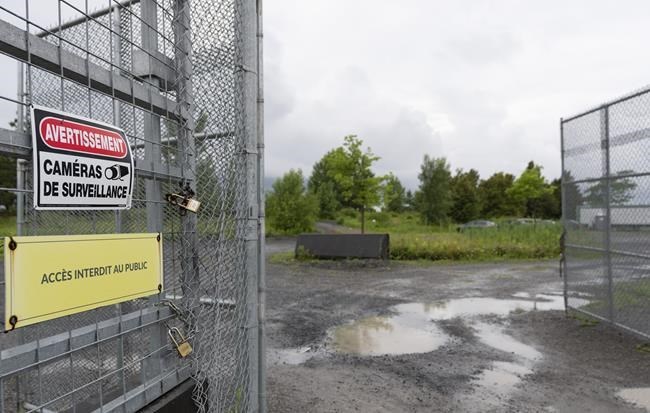MONTREAL — After several false starts, the City of Montreal announced on Friday a new vision to redevelop a former horse racing track into a neighbourhood for up to 40,000 people.
Calling the project a "city within a city," Mayor Valérie Plante said half the 20,000 units planned for the site in and around the old Hippodrome will be reserved for affordable housing.
For years city officials have tried to build on the site — the most recent failure was in the fall in 2022, when Plante couldn't get a single company interested in submitting a bid to construct housing on the land, most of which isn't connected to the city's water infrastructure.
But this time is different, Plante said, "because the city is not alone."
Seized with a national housing crisis, the federal government has joined the project. Ottawa, Quebec and the City of Montreal are together spending $6 million for technical studies on the 95 hectares of land, which has laid barren for 14 years and has been owned by the city since 2017. The studies are to determine how to optimize costs to connect the area to city infrastructure and public transit.
Plante said she wants to make sure the project is done right: a neighbourhood that includes schools, community and cultural facilities, and public transit — possibly a tramway. The project will add the equivalent of a town the size of Boucherville or Rouyn-Noranda inside the City of Montreal, Plante said, noting that as many as 40,000 people could live in the area.Â
Pierre Boivin, CEO of investment firm Claridge, who helped draft a new development model for the property, said he's confident this new plan will succeed where others have failed. Things have changed dramatically in the past calendar year now that the provincial and federal governments are eager to accelerate affordable housing development, he said.
Boivin said the potential implication of the Canada Infrastructure Bank in helping to finance the water infrastructure network allows the city to believe the project will finally get off the ground. Montreal could never pay for that alone, he said.
There are no private investors yet for the racetrack site, but that's not surprising with no infrastructure in place, which would cost at least $1.4 billion to build, he said.
"We're fortunate that today we have a new potential partner in the Infrastructure Bank of Canada that a year ago wouldn't have been there," said Boivin, who co-led a city-appointed working group.
"So you ask yourselves, why did things never start? Over the last two decades, there are many reasons, but that's certainly one: the impossibility financially to bring the infrastructure to start to think about how you're going to develop a community."
Consultations are planned for later this year and shovels could be in the ground sometime in 2025. "But a year from today, we've got to be saying 'go,'" Boivin said of the project that is estimated to cost $8 billion over 10 years.
Federal Housing Minister Sean Fraser and Quebec Housing Minister France-Élaine Duranceau attended the news conference Friday, but neither would say how much either level of government would invest in the project.
An Opposition city councillor and housing critic panned the city's announcement, saying the project seems to be repeating mistakes made in 2022 when a call for tenders attracted no promoters.
"The City of Montreal has owned the land for seven years and after seven years, all we are presented with is six million dollars to carry out additional studies," said Coun. Julien HĂ©nault-Ratelle.
"We have no commitment from the point of view of the necessary sums from the city, the provincial or federal government to create the underground infrastructures that are necessary to be done before any real estate development."
This report by The Canadian Press was first published April 19, 2024.
Sidhartha Banerjee, The Canadian Press



